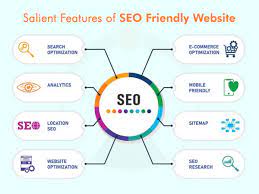The Importance of Building an SEO-Friendly Website
Search Engine Optimization (SEO) plays a crucial role in ensuring your website ranks well in search engine results pages. An SEO-friendly website is designed and developed with search engines in mind, making it easier for them to crawl, index, and understand your content. By implementing best practices for SEO, you can improve your website’s visibility, attract more organic traffic, and ultimately drive conversions.
Key Elements of an SEO-Friendly Website
When creating an SEO-friendly website, there are several key elements to consider:
- Keyword Research: Conduct thorough keyword research to identify relevant keywords that your target audience is searching for. Use these keywords strategically throughout your website’s content.
- Quality Content: Create high-quality, engaging content that provides value to your visitors. Ensure your content is well-written, informative, and relevant to your target audience.
- Title Tags and Meta Descriptions: Optimise your title tags and meta descriptions with relevant keywords to improve click-through rates in search results.
- Mobile Responsiveness: Ensure your website is mobile-friendly and responsive across all devices. Mobile-friendliness is a key ranking factor for search engines.
- Site Speed: Optimise your website’s loading speed to provide a better user experience. Slow-loading websites can impact rankings and user engagement.
- User Experience (UX): Design your website with user experience in mind. Easy navigation, clear call-to-actions, and intuitive design contribute to a positive user experience.
- Internal Linking: Use internal linking to connect related pages within your website. This helps search engines understand the structure of your site and improves indexing.
The Benefits of an SEO-Friendly Website
An SEO-friendly website offers numerous benefits for businesses looking to establish a strong online presence:
- Increased Visibility: By ranking higher in search engine results pages, you can increase visibility and attract more organic traffic to your site.
- Better User Experience: A well-optimised website provides a seamless user experience, leading to higher engagement and lower bounce rates.
- Growth Opportunities: With improved visibility and traffic, you have greater opportunities to reach new audiences, generate leads, and drive conversions.
- Long-Term Results: Investing in SEO-friendly practices can yield long-term results by establishing a strong foundation for sustainable online growth.
In conclusion, building an SEO-friendly website is essential for improving online visibility, attracting organic traffic, and driving business growth. By implementing best practices for SEO throughout the design and development process, you can create a strong digital presence that resonates with both users and search engines.
Top 5 Tips for Creating an SEO-Friendly Website
- Create high-quality, relevant content that is valuable to your target audience.
- Optimize your website’s meta tags, including title tags and meta descriptions, with relevant keywords.
- Improve website loading speed by optimizing images and reducing unnecessary plugins.
- Ensure your website is mobile-friendly and responsive for a better user experience.
- Build quality backlinks from reputable websites to improve your site’s authority and ranking.
Create high-quality, relevant content that is valuable to your target audience.
Creating high-quality, relevant content that offers value to your target audience is a fundamental aspect of building an SEO-friendly website. By producing content that is informative, engaging, and tailored to the needs of your audience, you not only attract visitors but also establish credibility and authority in your niche. Search engines reward websites that provide valuable content by ranking them higher in search results, ultimately driving organic traffic and increasing user engagement. Prioritising quality and relevance in your content creation strategy is key to enhancing your online visibility and achieving long-term success in the digital landscape.
Optimize your website’s meta tags, including title tags and meta descriptions, with relevant keywords.
To enhance the SEO-friendliness of your website, it is crucial to optimise your meta tags, such as title tags and meta descriptions, by incorporating relevant keywords. By strategically placing keywords in these meta tags, you can improve your website’s visibility in search engine results pages and attract more organic traffic. Effective keyword optimisation in meta tags not only helps search engines understand the relevance of your content but also entices users to click through to your website. This simple yet powerful practice can significantly boost your website’s SEO performance and contribute to its overall online success.
Improve website loading speed by optimizing images and reducing unnecessary plugins.
To enhance the SEO-friendliness of your website, it is crucial to focus on improving website loading speed. One effective tip is to optimise images by compressing them without compromising quality and reducing unnecessary plugins that may slow down your site. By implementing these strategies, you can create a faster and more efficient website that not only enhances user experience but also boosts search engine rankings, ultimately driving more organic traffic to your site.
Ensure your website is mobile-friendly and responsive for a better user experience.
Ensuring that your website is mobile-friendly and responsive is a crucial tip for creating an SEO-friendly website. In today’s digital landscape, where mobile usage continues to rise, it is essential to provide a seamless browsing experience across all devices. A mobile-friendly website not only improves user experience but also positively impacts your search engine rankings, as search engines prioritise mobile-responsive sites. By optimising your website for mobile users, you can enhance engagement, reduce bounce rates, and ultimately drive more traffic to your site.
Build quality backlinks from reputable websites to improve your site’s authority and ranking.
Building quality backlinks from reputable websites is a crucial strategy to enhance your site’s authority and boost its ranking in search engine results. Backlinks act as a vote of confidence from other sites, signalling to search engines that your content is valuable and trustworthy. By earning backlinks from authoritative sources, you not only improve your site’s credibility but also increase its visibility and organic traffic. Focus on acquiring relevant and high-quality backlinks to establish a strong link profile that can positively impact your SEO efforts and help your website climb the ranks in search results.

